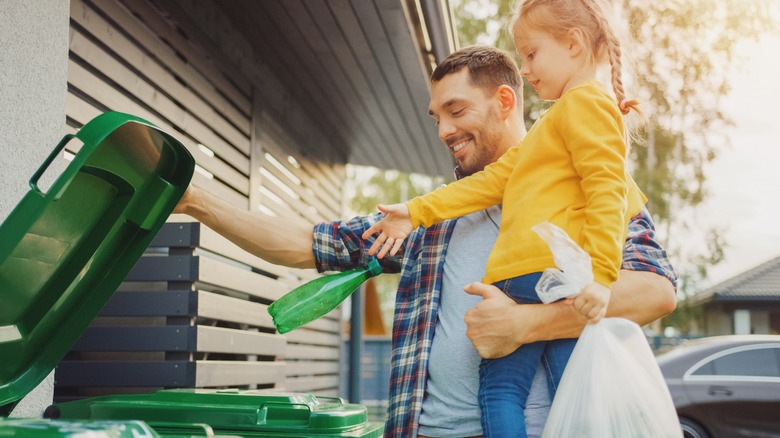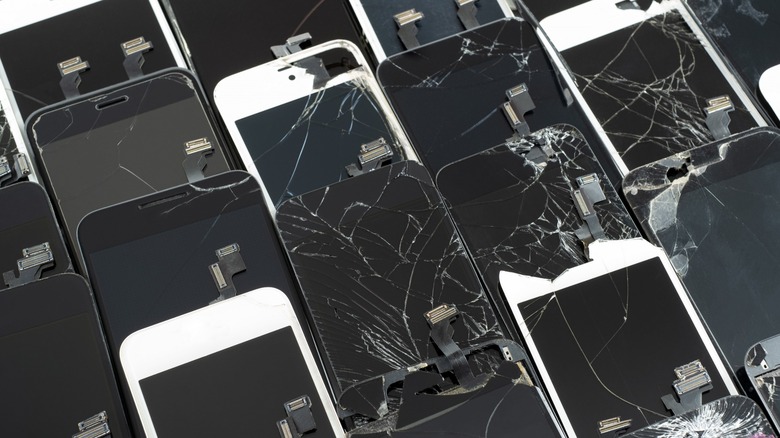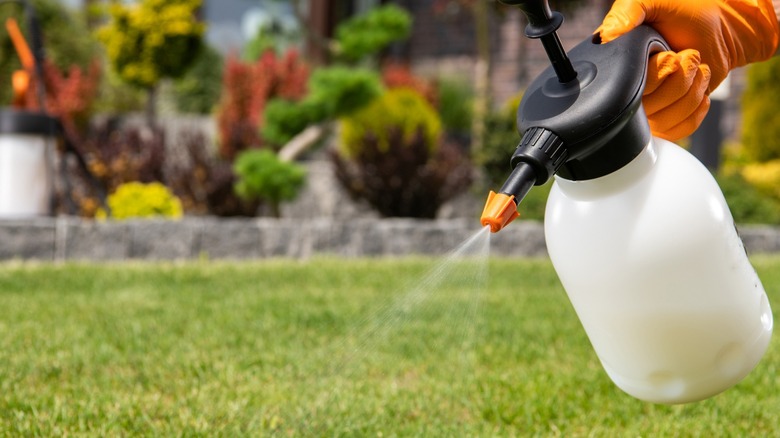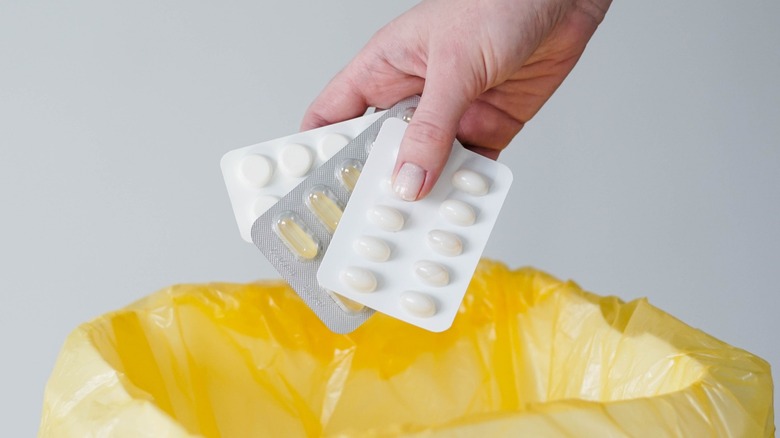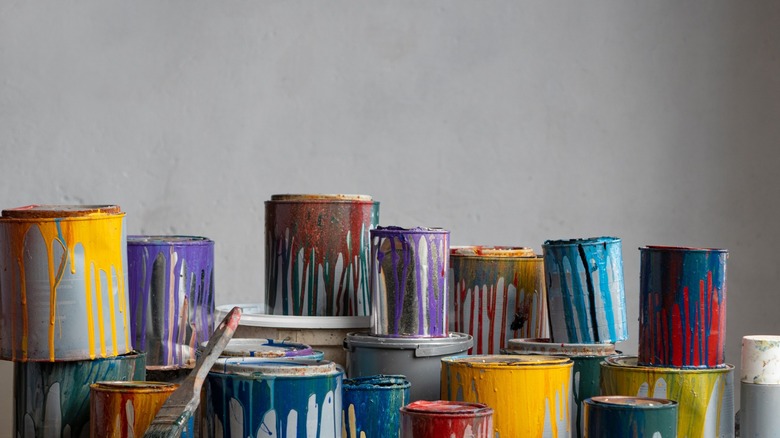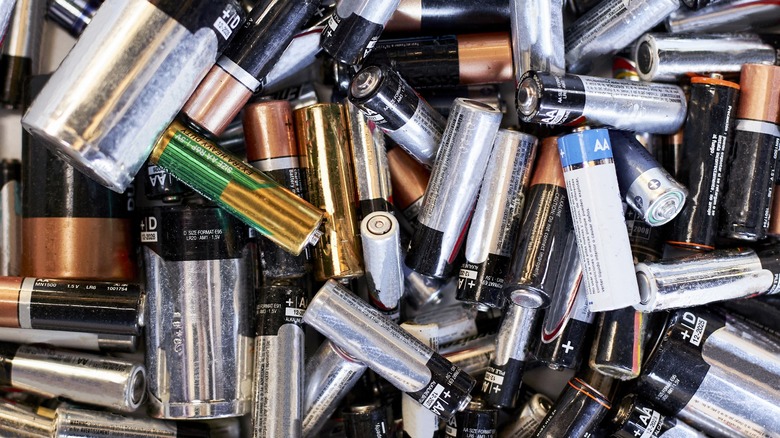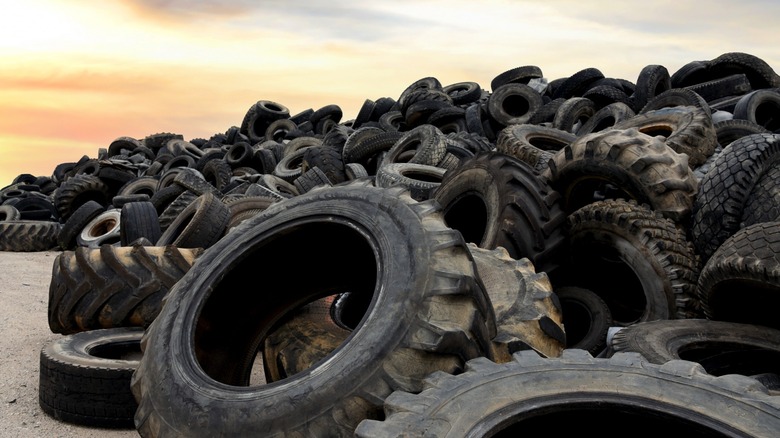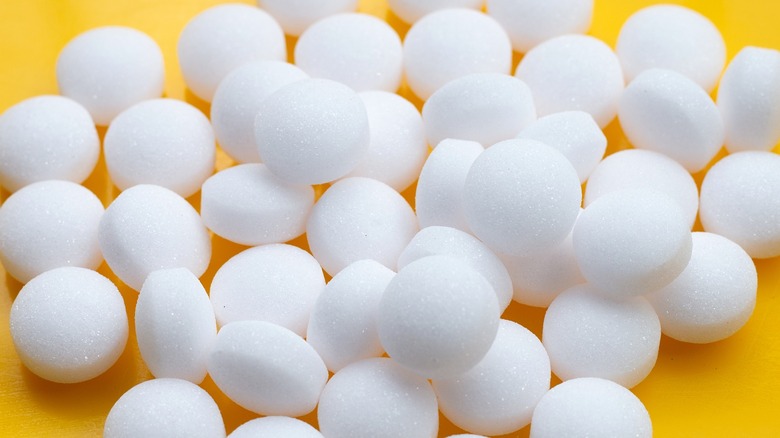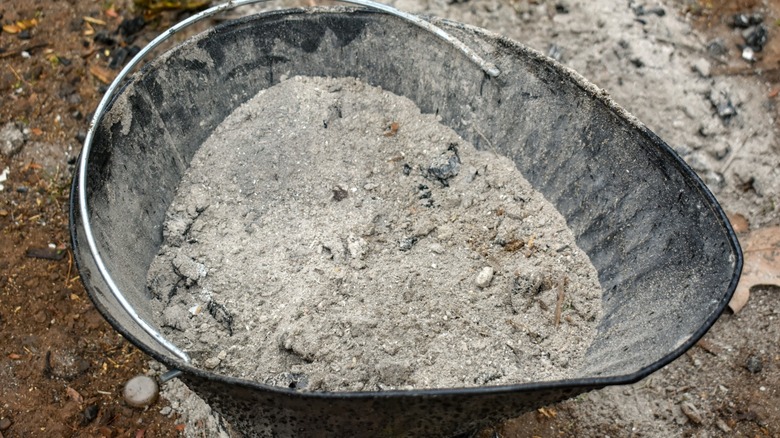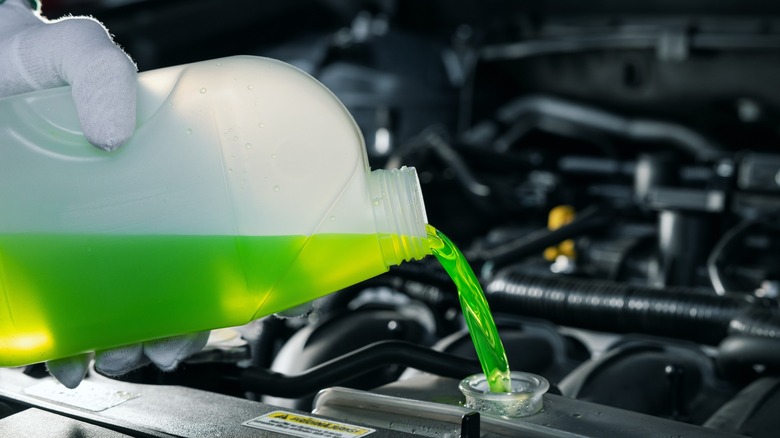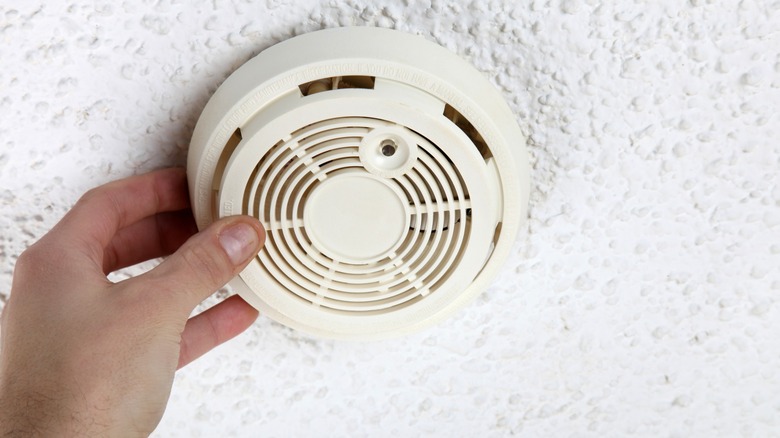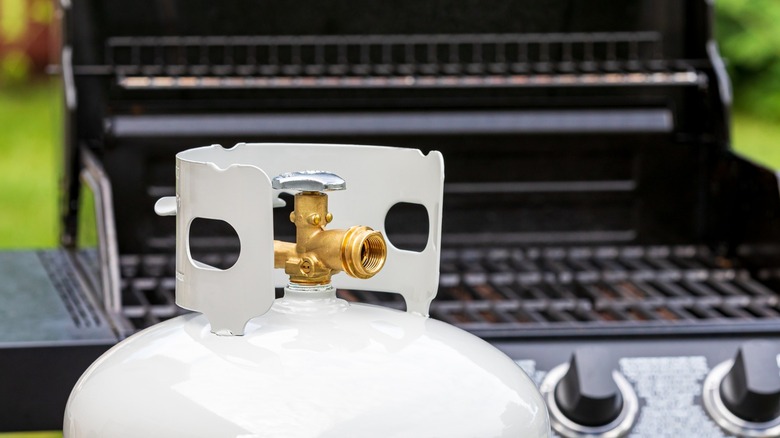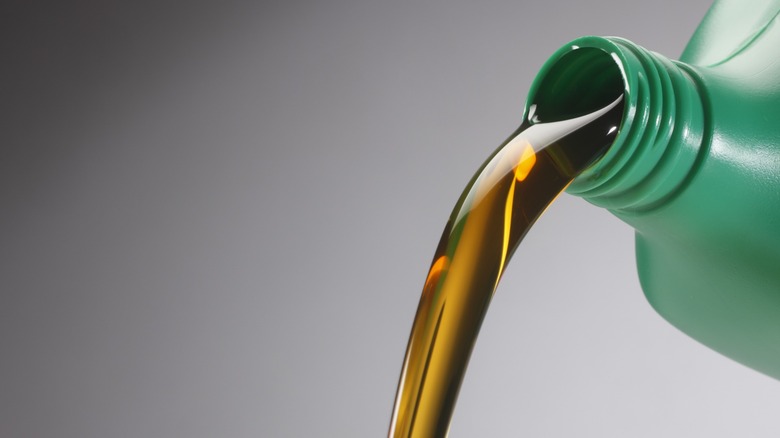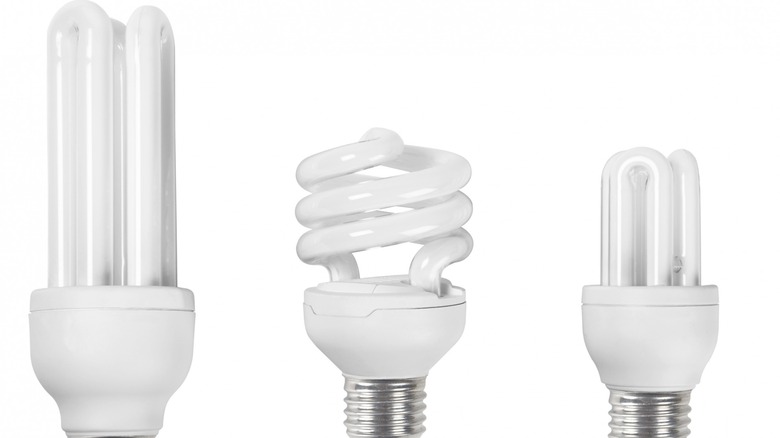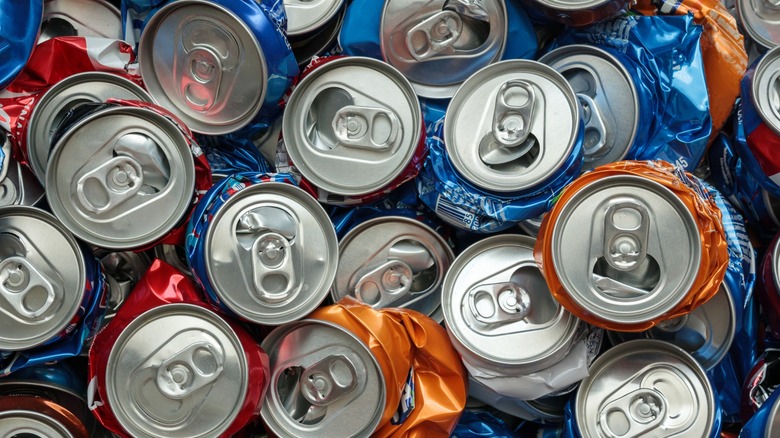15 Common Items You Should Avoid Putting In Your Trash Can
People throw things away all day long without putting much thought into it. But there are common items that should never be put into your trash can, for a variety of reasons. Some can cause damage to the environment and others should be recycled. In addition, inappropriate disposal of certain items can even be illegal or pose significant safety hazards.
It's important to know that local and state laws dictate what can be put in trash cans, so if you're ever unsure, just check the websites or make a call. In some cases, there are federal laws as well, which are administered by the EPA. In general, things classified as flammable, toxic, or hazardous should never be placed in household trash cans. While some might seem obvious (used motor oil) others are kind of surprising (mothballs). It requires more effort to dispose of them properly, but the goal is to keep the planet, animals, and humans safer. This includes garbage collectors, who provide an invaluable service. No one can argue with that.
1. Old electronics like cell phones and TVs are recyclable
There are countless cell phones and tablets around the world and even though used ones can be used for credit when purchasing new models, some make their way into trash cans. This is a mistake because they are made with copper, plastic, and metals that can all be recycled even when there is damage. Returning them to the supply chains means that manufacturers will produce fewer greenhouse gas emissions when making new ones.
As TV technology evolved over the past decades, consumers have upgraded from cathode-ray to plasma to 5K. Television sets that have outlived their useful lives can also be recycled through the proper channels. It may be illegal to throw these out, as some may contain lead, phosphorous, and other hazardous materials. Other electronics like computers and printers can also be recirculated back into the economy and many agencies will take them off your hands for free if you can transport the electronics to their locations. Otherwise, ask for a pickup and they may be able to accommodate you for a fee.
2. Lawn and garden chemicals can harm your health
Pesticides keep unwanted insects and animals away and might be all-natural or have toxic chemicals. The ones in the second category can pose significant environmental safety hazards when not disposed of properly because they can contaminate vegetation and water, and harm welcome visitors like birds and butterflies.
To stay on the safe side, read the label directions and only mix up the amount needed. Do not put excess insecticides in a trash can; see if a neighbor can use it or contact your community's household hazardous waste collection program. This can all be avoided by purchasing ready-to-use pesticides instead of ones that need to be mixed or diluted. As for the empty containers, they can be shaken out and triple-rinsed before recycling if local laws permit that, and remember to wear gloves when doing this to protect your hands. Follow all the same precautions when using, disposing of, and recycling fertilizers that contain chemicals.
3. Leftover prescription drugs can be dangerous
Many consumers realize that they shouldn't flush expired and unused prescription and over-the-counter drugs down toilets because they can harm the environment. But disposing of them in the garbage without the proper precautions is also the wrong thing to do. The risks here are that someone else might find the medications and ingest them or that liquid ones might leak into the can. The safest way to dispose of these is through drug take-back programs. Your local pharmacy might have one set up, with a drop-off box right inside. If not, check the U.S. Drug Enforcement Agency website or contact the local trash and recycling service.
The other option is to make the medication undesirable to others. Avoid crushing capsules and pills, but feel free to mix whole or cut-up ones in with yucky trash like leftover chicken or used cat litter. Then, push all that into sealable containers or bags before throwing them away. When old prescription bottles need to be disposed of, consider recycling them for household use like storing screws. Otherwise, cover up the RX number and your information with a dark marker and then throw them out.
4. Unused paint and solvents can be hazardous
Municipalities have different laws for paint and solvent disposal so it is best to err on the side of caution. Throwing out a used paint can puts it on the road toward a landfill and what's inside can harm the environment. When filled paint cans get smashed down in the back of trash trucks, the liquid can leach out. To prevent this from happening, allow it to dry out before disposal by leaving the top open or pouring in cat litter.
Some towns allow residents to throw out old paint by putting dried paint cans in with the trash but check with a local waste management agency first. They may refer you to a drop-off site or another agency that accepts the cans. But if the paint is still usable, think about donating it to a worthy organization. A community theatre, camp, or local school might be able to benefit from it. When the cans are well-sealed, the paint inside can last for years but keep it in the original container with the label intact until it gets used.
Paint solvents should be handled a bit differently. After they've been used, you can allow the solids to settle on the bottom of the container, remove them, and recycle the liquid in a tightly closed, properly labeled container The solids can be dried out just like paint and thrown in the trash, or taken to a hazardous waste disposal center.
5. Don't toss out all old household batteries
People often buy batteries in bulk because so many household items run on them. But some contain things like mercury, lead, or lithium that can be hazardous when not disposed of correctly. Read the label first to see what you are dealing with because the shapes and colors alone don't always tell the whole story.
Common, single-use batteries like AA, D, and 9-volt are generally used in flashlights, toys, and remote control devices. These can typically be thrown away when no longer usable, but it's more sustainable to take them to battery recyclers. Single-use lithium batteries should be handled differently because they can spark and start a fire; button-cell and coin batteries are possible swallowing hazards. For lithium batteries, cover the terminals with electrical tape or place them in separate plastic bags – the small button batteries can also be sealed in the latter. Rechargeable nickel, lithium, and nickel metal hydride batteries can be handled with the same precautions. And when a dead battery is not removable, take the device to a certified electronics recycler.
6. Old tires can be reused
It's not unusual to see old, deteriorating tires in people's yards because the large size makes them hard to transport. It's possible to squeeze smaller ones in trashcans but avoid this because they are non-biodegradable. They're made from synthetic rubber, which can bleed toxins and harm the environment. And not only that, but scrap tires present a serious fire hazard because they trap methane gas. Old tires in landfills can hold water, attracting mosquitos that can breed and spread diseases like West Nile Virus.
Fortunately, old tires can also be recycled and some people use them for outdoor landscaping. They can be used to edge gardens, for raised beds, and even for creatively designed outdoor furniture and lawn art – synthetic rubber can be cut and painted into some amazing shapes. Recycled tires can also be turned into fuel, and ground down into aggregate that's used to make asphalt or backfill for construction projects.
7. Mothballs contain toxic ingredients
Here is the most surprising item that should never be put in your trash can: mothballs or moth flakes. They are actually regulated pesticides even though they are small and round instead of being in liquid or powder form. They can contain flammable naphthalene and paradichlorobenzene, which are both toxic chemicals. If you use mothballs, don't flush them down the toilet either. These innocent-looking white balls resemble candy, so mark them as poison and store them in safe areas with your other pesticides, away from children and pets. They are classified as Household Hazardous Waste, and ingesting them can be fatal. Inhaling the fumes they produce can also cause respiratory issues.
Mothballs dissolve in water, but then the chemicals leach into the liquid so it doesn't solve the problem. Always keep them in tightly sealed containers, even when they are used in closets and other areas. They should be kept in there and taken to household hazardous disposal sites when it is time to dispose of mothballs after you're done using them in your home.
8. Loose ashes have to be put in metal containers first
Fireplace, wood-burning stove, and grill ashes need to be removed regularly for disposal but if they're not handled carefully, fires can start. This can happen even when this waste appears to have cooled down enough. Instead of just giving them a small amount of time to get to room temperature, ashes need 96 hours, or four days at the minimum to be safe enough to be put in trash cans. And even then, it's best to check for hot spots and/or soak them in water first.
Store the ashes in an approved, fire-resistant container, keeping it tightly sealed. Placing ashes in cardboard, plastic, and paper containers is dangerous because the fire could reignite. The metal container can be put in the trash can. But if you're into gardening, certain kinds of wood ash can be used as fertilizer for flowers and vegetables because it contains beneficial nutrients and can neutralize soil pH. Only use ash from wood that has been grown in natural areas and sift it once it has been properly cooled.
9. Be careful with antifreeze
Most communities prohibit people from disposing of antifreeze in landfills because this substance is poisonous to humans, animals, and the environment. This brightly-colored engine coolant is needed to keep vehicles in good working condition but it is not unusual for users to be unaware of the proper disposal methods. Antifreeze contains ethylene glycol; this is typically where that fluorescent greenish color comes from. These liquids can contain methanol too, which is also dangerous. And oddly enough, ethylene glycol has a sweet taste that might appeal to someone who fishes the container out of the trash. Consuming antifreeze can lead to kidney failure and death.
Antifreeze can also get into drinking water, open water sources, and the ground. If you change yours at home, pour it into a plastic container after it's been drained and close the lid tightly. Check for local collection sites and call an area auto parts shop or gas station if you cannot locate one. When driving it to the site, make sure it's tightly secured in the vehicle to prevent spillage. When antifreeze has not been mixed with other contaminants like motor oil, it can be recycled repeatedly.
10. Old smoke detectors should be disposed of properly
Smoke detectors save lives and this makes them an integral and invaluable part of any safe home. But when replacements are needed, the old ones should not be trashed. Most models contain trace amounts of Americium 241, an innocent-sounding but man-made radioactive metal. It also goes by the name radionuclide. Why do lifesaving smoke detectors contain Americium 241? It is built into their sensing chambers to help conduct electricity. If a fire starts and smoke gets in there, the radionuclide pauses the electrical current. This in turn sets off the smoke alarm.
Americium 241 exposure from a working smoke alarm is unlikely but if the unit gets compressed it could release microscopic and potentially harmful dust into the air. You can try contacting the manufacturer to ask if they will accept it for recycling. If not, look into municipal recycling programs that might take them off your hands.
11. Refer to state laws when disposing of gas cylinders
Homeowners and campers who have gas grills use propane cylinders that hold this fuel and once it is depleted they can return and replace them with filled ones. Two of the most common kinds are 1-pound and 20-pound. Tossing old ones in the trash can is ill-advised and could even be deadly. The possibility of one exploding is very real, especially when it is being handled and transported by workers who do not know that a cylinder is lurking inside. The same risks are present with medical oxygen cylinders and helium tanks.
State laws differ on gas cylinder disposal and recycling, so research these options first. Some city or county authorities may permit it but not if there is hazardous waste inside. Recycling facilities may take them for scrap metal but the valve may need to be removed and the cylinder cut down the middle. If your cylinder has unidentified contents or is damaged, contact the manufacturer for instructions.
12. Help the environment by recycling used motor oil and filters
Used motor oil never breaks down but the dirt it contains can be cleaned out, making the liquid recyclable. States like California have laws that make it illegal to dump motor oil into drains and elsewhere. Residents are also prohibited from putting in trash cans, even when it's in sealed containers. That's because the oil can leak out and pollute whatever it comes into contact with; when it gets into the ground, it contaminates the soil.
Take your used motor oil to a certified collection site, but check to see what the daily limits are first if you have a large amount to recycle. They cannot accept contaminated motor oil that has things like water or gasoline in it, either. Service stations may take used oil and oil filters, too. Once the used oil is re-refined, it is practically like what you get in a new can.
13. LED and fluorescent light bulbs contain toxic ingredients
Like the rest of this list, there's also a right way to dispose of lightbulbs. Halogen and incandescent light bulbs can be safely tossed in the trash whole but if there are broken pieces, don a pair of safety gloves and gather up the pieces. Put them in a sealed bag and then throw them away; this will prevent others who handle the trash from getting cut. LED bulbs should be handled differently because they are made with microchips that have small amounts of arsenic and lead. Those heavy metals make LEDs appropriate for recycling centers that keep them out of landfills.
Fluorescent tubes, including newer compact ones, contain something else: mercury. If these end up in the trash those toxins could get into the local water supply. Home Depot offers a mail-in service for recycling some used LED bulbs and there are a few others as well. But if one of these bulbs breaks, open the windows and get everyone out of the room. Wait 10 minutes for the mercury vapors to clear out and use that time to get some sticky tape, damp paper towels, and stiff cardboard. Use those to clean up the mess and put it all in a sealed container. If there is no local collection center, throw the container in the trash.
14. Aluminum cans can live forever
A case of soda, seltzer, or beer cans can create a lot of waste and it is a shame when they are not recycled. They are made from metal, a nonrenewable natural resource, which means that they get used up faster than new ones can be manufactured. But just like antifreeze and motor oil, aluminum can be recycled endlessly into new products.
New aluminum production is also bad for the environment. Manufacturers must extract it from bauxite, a naturally occurring, mineral-containing rock. This process produces tons of red-colored waste, a toxic sludge that releases pollutants into the water, air, and ground. Recycling aluminum uses much less energy than the extraction process. Always recycle aluminum cans and anything else in your home made from this metal. In many communities with single-stream recycling, they can be tossed into recycling bins along with other things like newspapers and plastic. It all gets separated once they arrive at Materials Recovery Facilities (MRFs).
15. Don't ditch uncovered dog waste in the trash can
Hopefully, most dog owners avoid throwing uncovered dog poo in trash cans because it is unclean, but they may not realize that it can also cause diseases spread by gastrointestinal parasites like hookworms. It can also attract insects and turn into a nasty mess.
Several safer, cleaner options are better than random ditching. The first is to slowly lower the poo out from a bag into a toilet and flush it away. Only use biodegradable dog waste bags, though. Even when regular plastic bags are being used more than once they can take up to 1,000 years to decompose. And believe it or not, dog poo can be composted. There are dog composters made for this purpose but they should be kept separate from other composting containers. Cat poo cannot be composted because it contains a dangerous parasite that causes a disease known as toxoplasmosis, so put used kitty litter in biodegradable bags before putting that in the can, too.
